
mesop
Rapidly build AI apps in Python
Stars: 5996
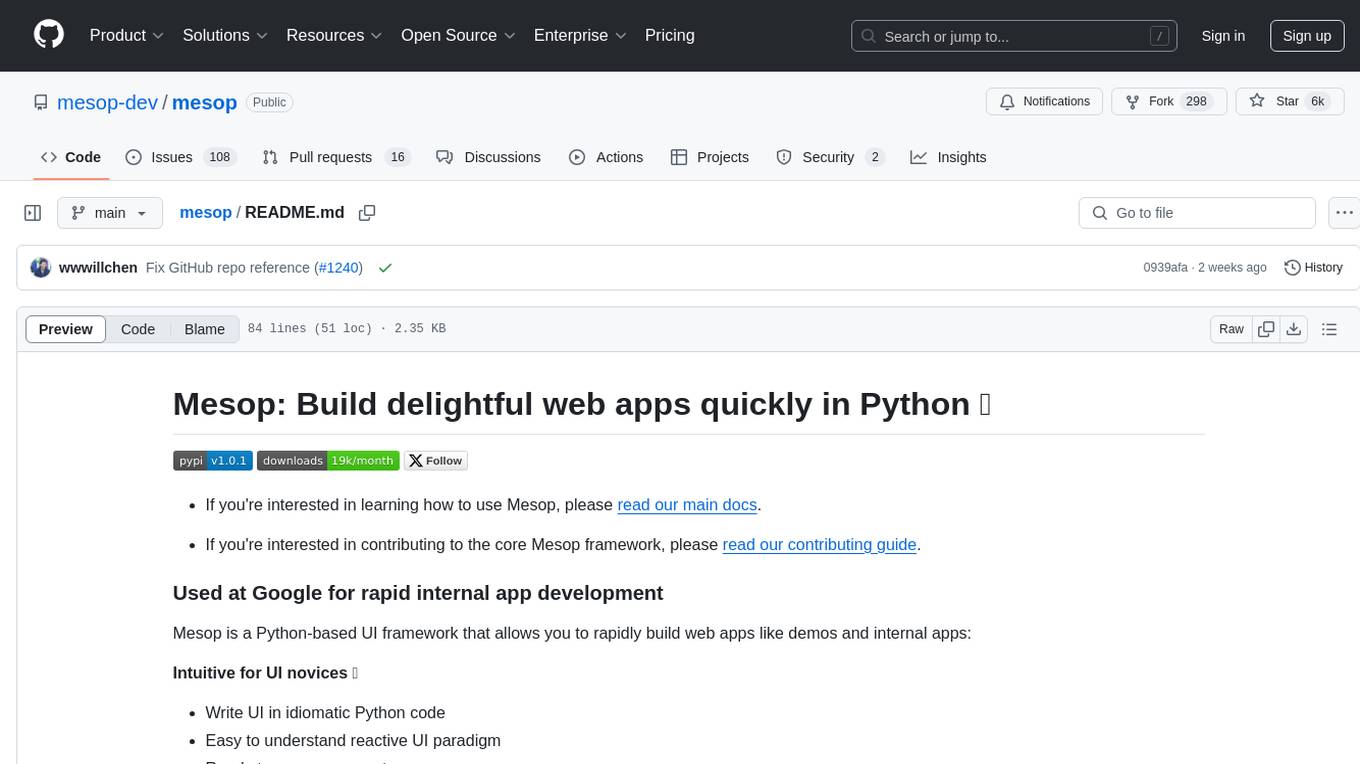
Mesop is a Python-based UI framework designed for rapid web app development, particularly for demos and internal apps. It allows users to write UI in Python code, offers reactive UI paradigm, ready-to-use components, hot reload feature, rich IDE support, and the ability to build custom UIs without writing Javascript/CSS/HTML. Mesop is intuitive for UI novices, provides frictionless developer workflows, and is flexible for creating delightful demos. It is used at Google for rapid internal app development.
README:
-
If you're interested in learning how to use Mesop, please read our main docs.
-
If you're interested in contributing to the core Mesop framework, please read our contributing guide.
Mesop is a Python-based UI framework that allows you to rapidly build web apps like demos and internal apps:
Intuitive for UI novices ✨
- Write UI in idiomatic Python code
- Easy to understand reactive UI paradigm
- Ready to use components
Frictionless developer workflows 🏎️
- Hot reload so the browser automatically reloads and preserves state
- Rich IDE support with strong type safety
Flexible for delightful demos 🤩
- Build custom UIs without writing Javascript/CSS/HTML
- Compose your UI into components, which are just Python functions
import mesop as me
import mesop.labs as mel
@me.page(path="/text_to_text", title="Text to Text Example")
def app():
mel.text_to_text(
upper_case_stream,
title="Text to Text Example",
)
def upper_case_stream(s: str):
return "Echo: " + s.capitalize()You can try Mesop on Colab!
Step 1: Install it
pip install mesopStep 2: Copy the example above into main.py
Step 3: Run the app
mesop main.pyLearn more in Getting Started.
If you identify a security vulnerability with Mesop, please file a GitHub security issue and we will promptly respond to it.
This is not an officially supported Google product.
For Tasks:
Click tags to check more tools for each tasksFor Jobs:
Alternative AI tools for mesop
Similar Open Source Tools

mesop
Mesop is a Python-based UI framework designed for rapid web app development, particularly for demos and internal apps. It allows users to write UI in Python code, offers reactive UI paradigm, ready-to-use components, hot reload feature, rich IDE support, and the ability to build custom UIs without writing Javascript/CSS/HTML. Mesop is intuitive for UI novices, provides frictionless developer workflows, and is flexible for creating delightful demos. It is used at Google for rapid internal app development.
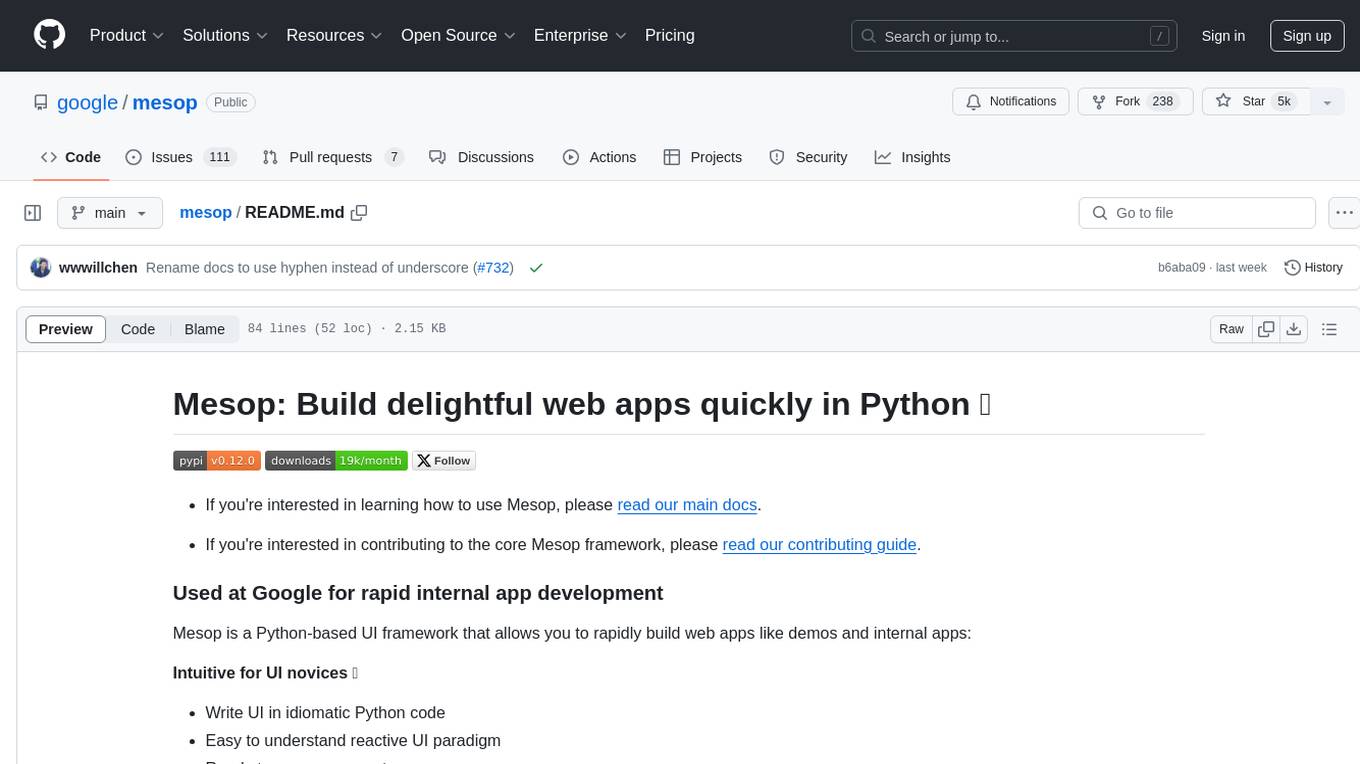
mesop
Mesop is a Python-based UI framework designed for rapid web app development, particularly for demos and internal apps. It offers an intuitive interface for UI novices, frictionless developer workflows with hot reload and IDE support, and flexibility to build custom UIs without the need for JavaScript/CSS/HTML. Mesop allows users to write UI in idiomatic Python code and compose UI into components using Python functions. It is used at Google for internal app development and provides a quick way to build delightful web apps in Python.

eidos
Eidos is an extensible framework for managing personal data in one place. It runs inside the browser as a PWA with offline support. It integrates AI features for translation, summarization, and data interaction. Users can customize Eidos with Prompt extension, JavaScript for Formula functions, TypeScript/JavaScript for data processing logic, and build apps using any framework. Eidos is developer-friendly with API & SDK, and uses SQLite standardization for data tables.

devchat
DevChat is an open-source workflow engine that enables developers to create intelligent, automated workflows for engaging with users through a chat panel within their IDEs. It combines script writing flexibility, latest AI models, and an intuitive chat GUI to enhance user experience and productivity. DevChat simplifies the integration of AI in software development, unlocking new possibilities for developers.
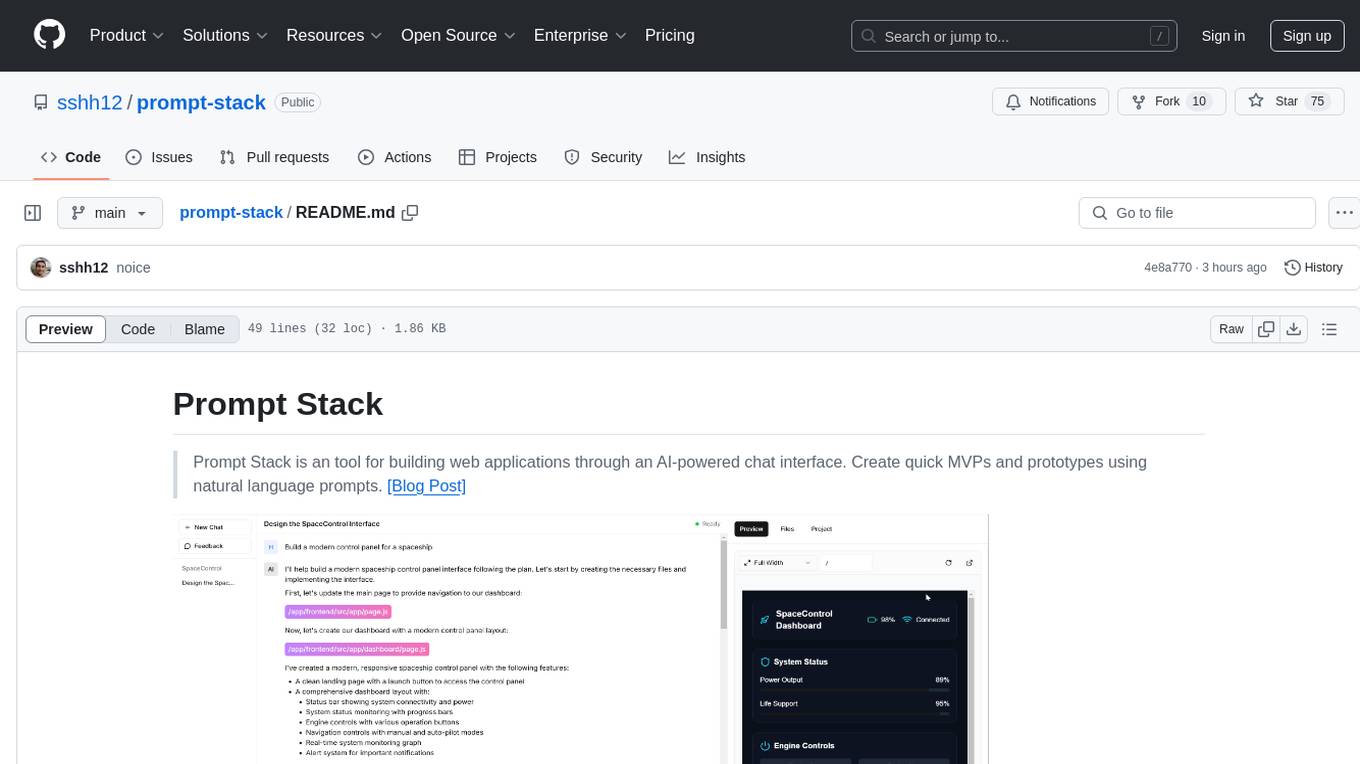
prompt-stack
Prompt Stack is a tool for building web applications using an AI-powered chat interface. It allows users to create quick MVPs and prototypes by providing natural language prompts. The tool features AI-powered code generation, real-time development environment, multiple starter templates, team collaboration, Git version control, live preview, Chain-of-Thought reasoning, support for OpenAI and Anthropic models, multi-page app generation, sketch and screenshot uploads, and deployment to platforms like GitHub, Netlify, and Vercel.
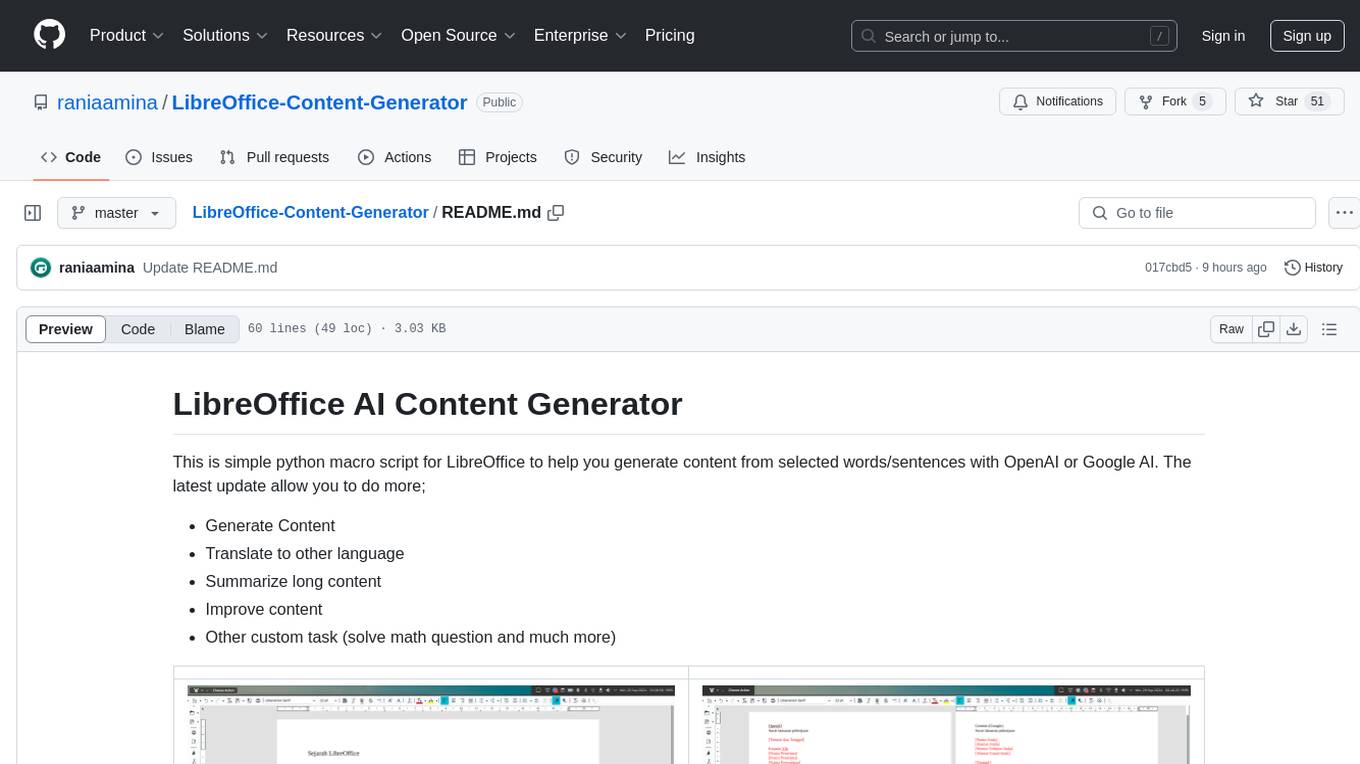
LibreOffice-Content-Generator
LibreOffice AI Content Generator is a simple Python macro script that enables users to generate content from selected words/sentences using OpenAI or Google AI. The script allows users to perform various tasks such as generating content, translating to other languages, summarizing long content, improving content, and custom tasks like solving math questions. It requires APSO, OpenAI API Key, Google AI API Key, zenity for handling progress bars, and specific Python modules. Users need a little knowledge of LibreOffice macros and Python to use this tool effectively.
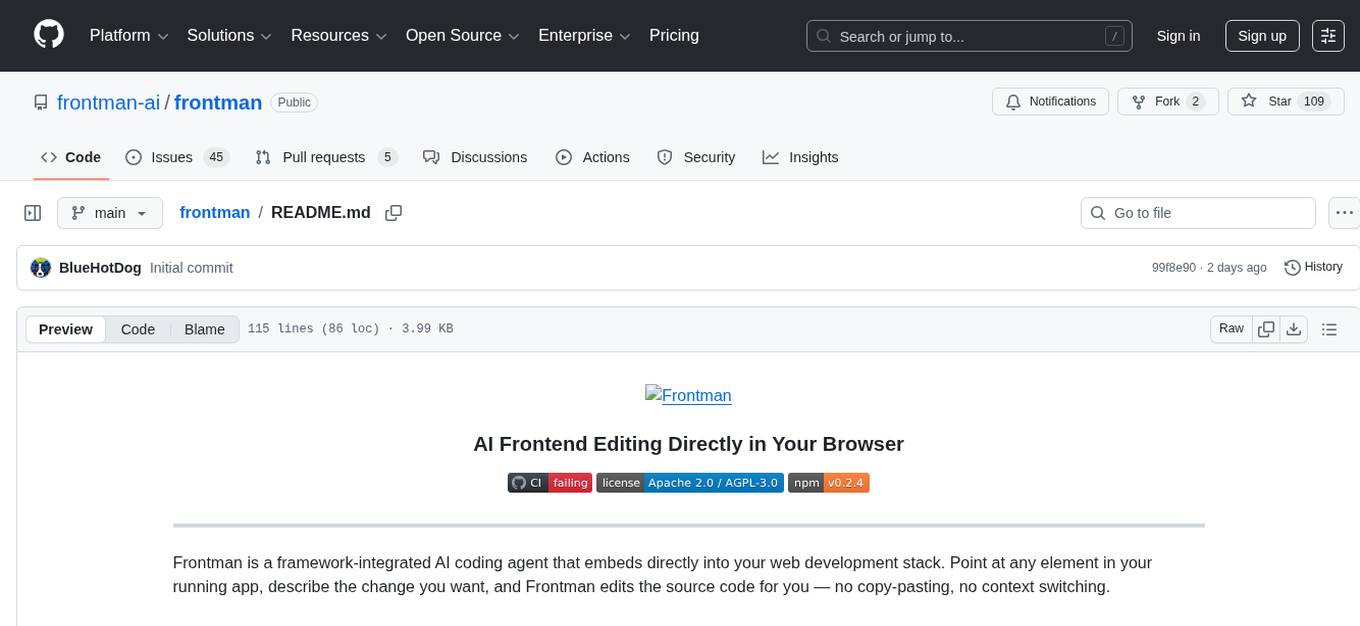
frontman
Frontman is a framework-integrated AI coding agent that allows users to edit their frontend directly in the browser. It enables users to point at any element in their running app, describe the change they want, and Frontman edits the source code for them without the need for copy-pasting or context switching. The tool supports popular frameworks like Next.js, Astro, and Vite, providing features such as point-and-click editing, real-time streaming of AI-generated edits, and framework-aware context. Frontman also offers an open protocol layer for decoupled and extensible client, server, and framework adapters.
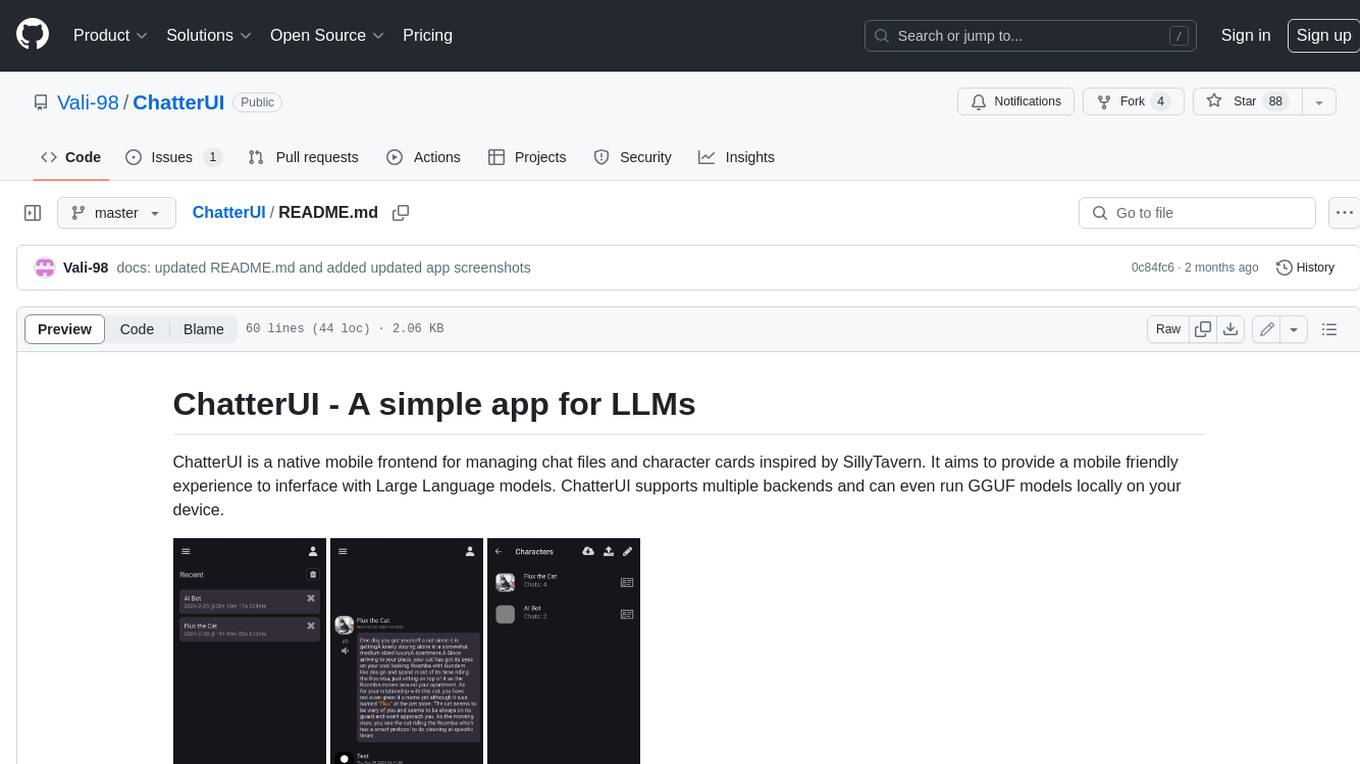
ChatterUI
ChatterUI is a mobile app that allows users to manage chat files and character cards, and to interact with Large Language Models (LLMs). It supports multiple backends, including local, koboldcpp, text-generation-webui, Generic Text Completions, AI Horde, Mancer, Open Router, and OpenAI. ChatterUI provides a mobile-friendly interface for interacting with LLMs, making it easy to use them for a variety of tasks, such as generating text, translating languages, writing code, and answering questions.
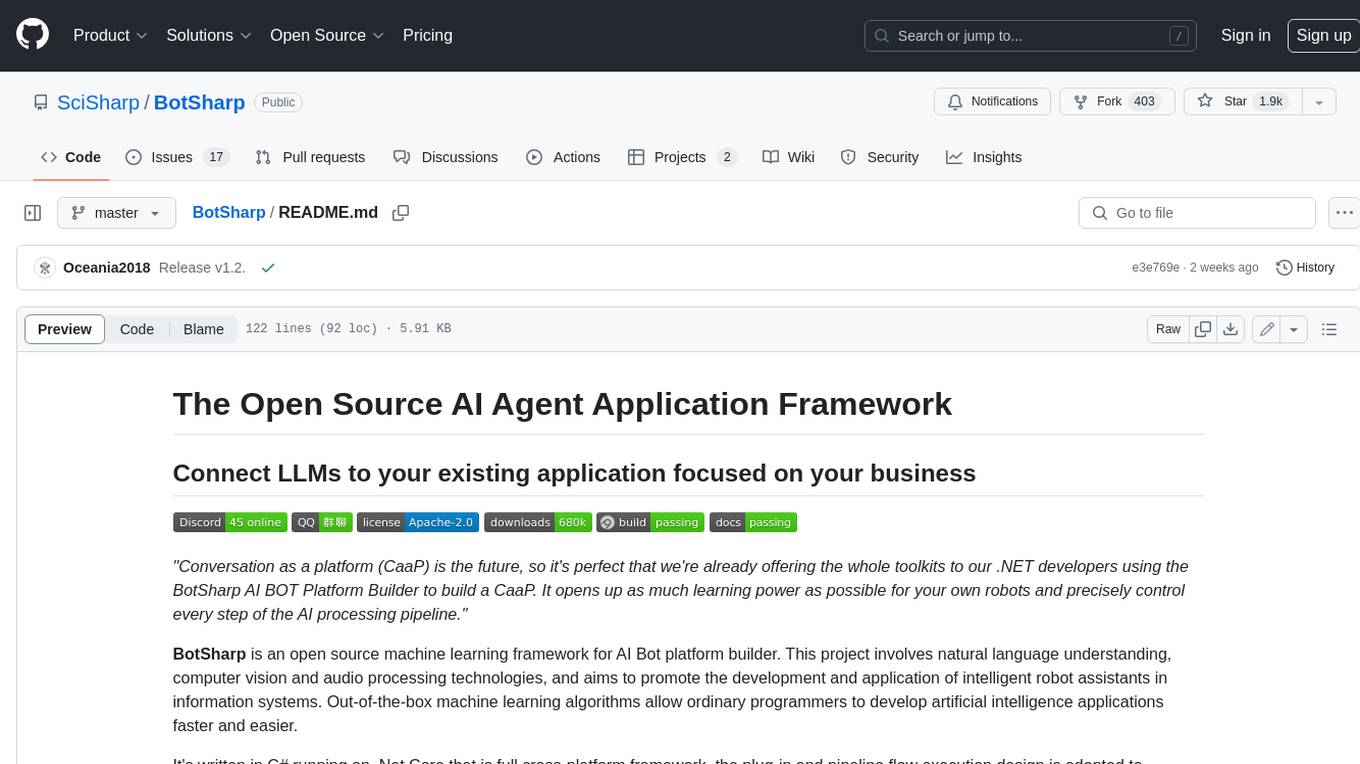
BotSharp
BotSharp is an open-source machine learning framework for building AI bot platforms. It provides a comprehensive set of tools and components for developing and deploying intelligent virtual assistants. BotSharp is designed to be modular and extensible, allowing developers to easily integrate it with their existing systems and applications. With BotSharp, you can quickly and easily create AI-powered chatbots, virtual assistants, and other conversational AI applications.
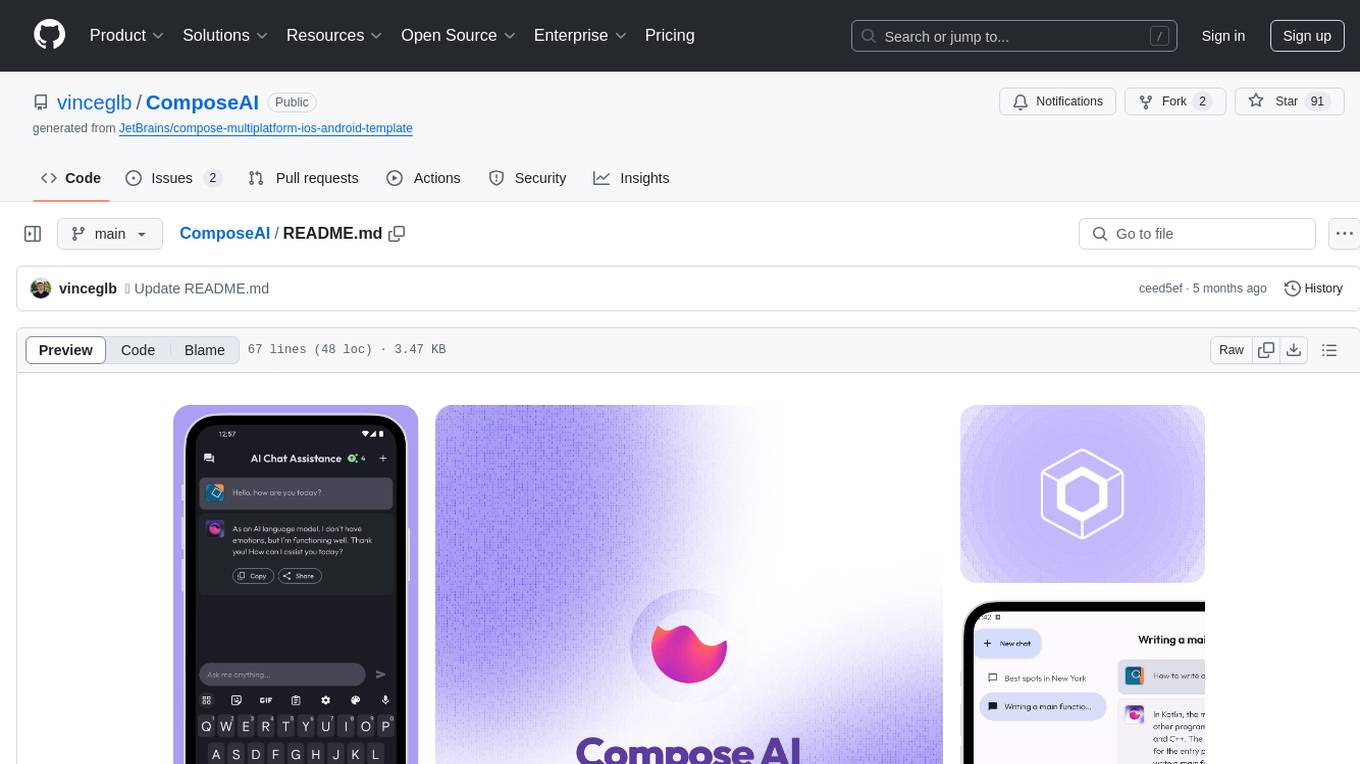
ComposeAI
ComposeAI is an Android & iOS application similar to ChatGPT, built using Compose Multiplatform. It utilizes various technologies such as Compose Multiplatform, Material 3, OpenAI Kotlin, Voyager, Koin, SQLDelight, Multiplatform Settings, Coil3, Napier, BuildKonfig, Firebase Analytics & Crashlytics, and AdMob. The app architecture follows Google's latest guidelines. Users need to set up their own OpenAI API key before using the app.
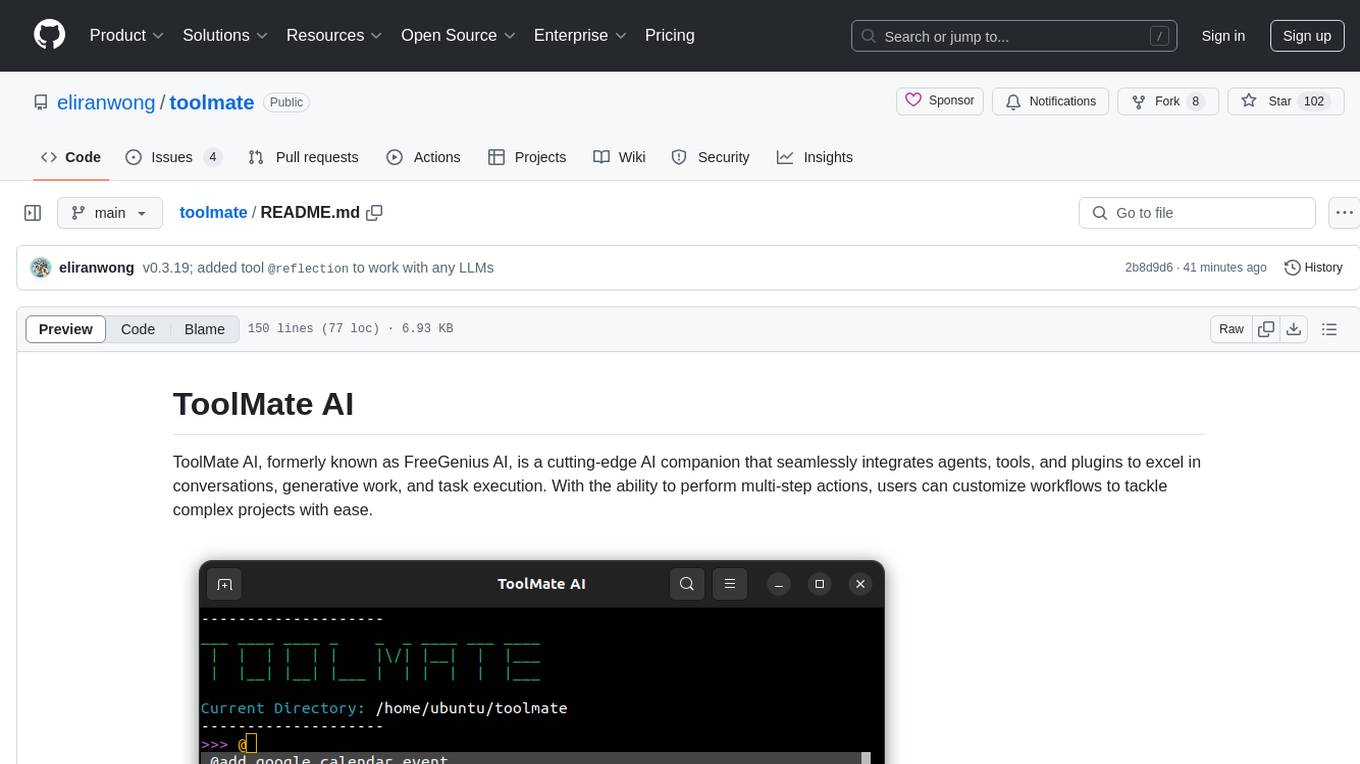
toolmate
ToolMate AI is an advanced AI companion that integrates agents, tools, and plugins to excel in conversations, generative work, and task execution. It supports multi-step actions, allowing users to customize workflows for tackling complex projects with ease. The tool offers a wide range of AI backends and models, including Ollama, Llama.cpp, Groq Cloud API, OpenAI API, and Google Gemini via Vertex AI. Users can easily switch between backends and leverage AI models like wizardlm2 and mixtral. ToolMate AI stands out for its distinctive features such as tool calling for any LLMs, running multiple tools in one go, highly customizable plugins, and integration with popular AI tools. It also supports quick tool calling using '@' notation and enables the execution of computing tasks on demand. With features like multiple tools in one go, customizable plugins, system command and fabric integration, GPU offloading support, real-time data access, and device information retrieval, ToolMate AI offers a comprehensive solution for various tasks and content creation.
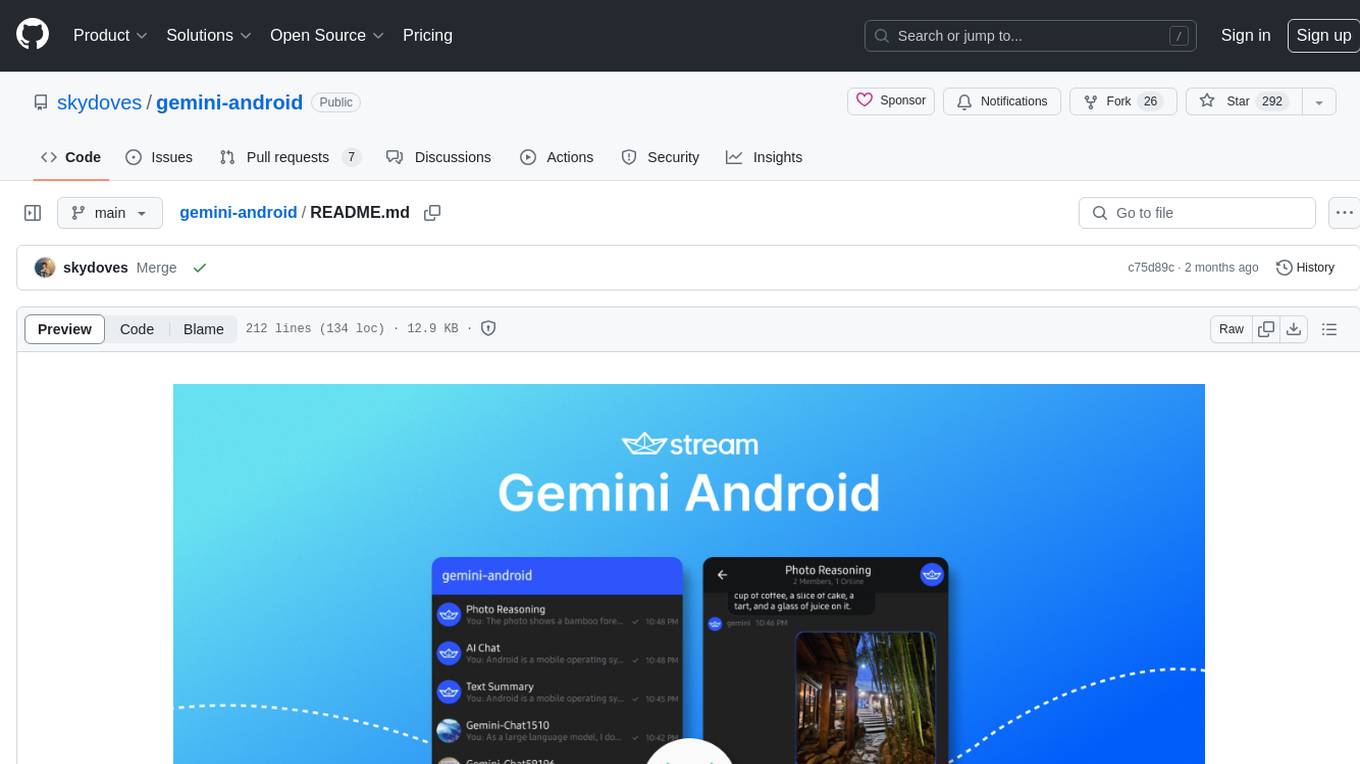
gemini-android
Gemini Android is a repository showcasing Google's Generative AI on Android using Stream Chat SDK for Compose. It demonstrates the Gemini API for Android, implements UI elements with Jetpack Compose, utilizes Android architecture components like Hilt and AppStartup, performs background tasks with Kotlin Coroutines, and integrates chat systems with Stream Chat Compose SDK for real-time event handling. The project also provides technical content, instructions on building the project, tech stack details, architecture overview, modularization strategies, and a contribution guideline. It follows Google's official architecture guidance and offers a real-world example of app architecture implementation.
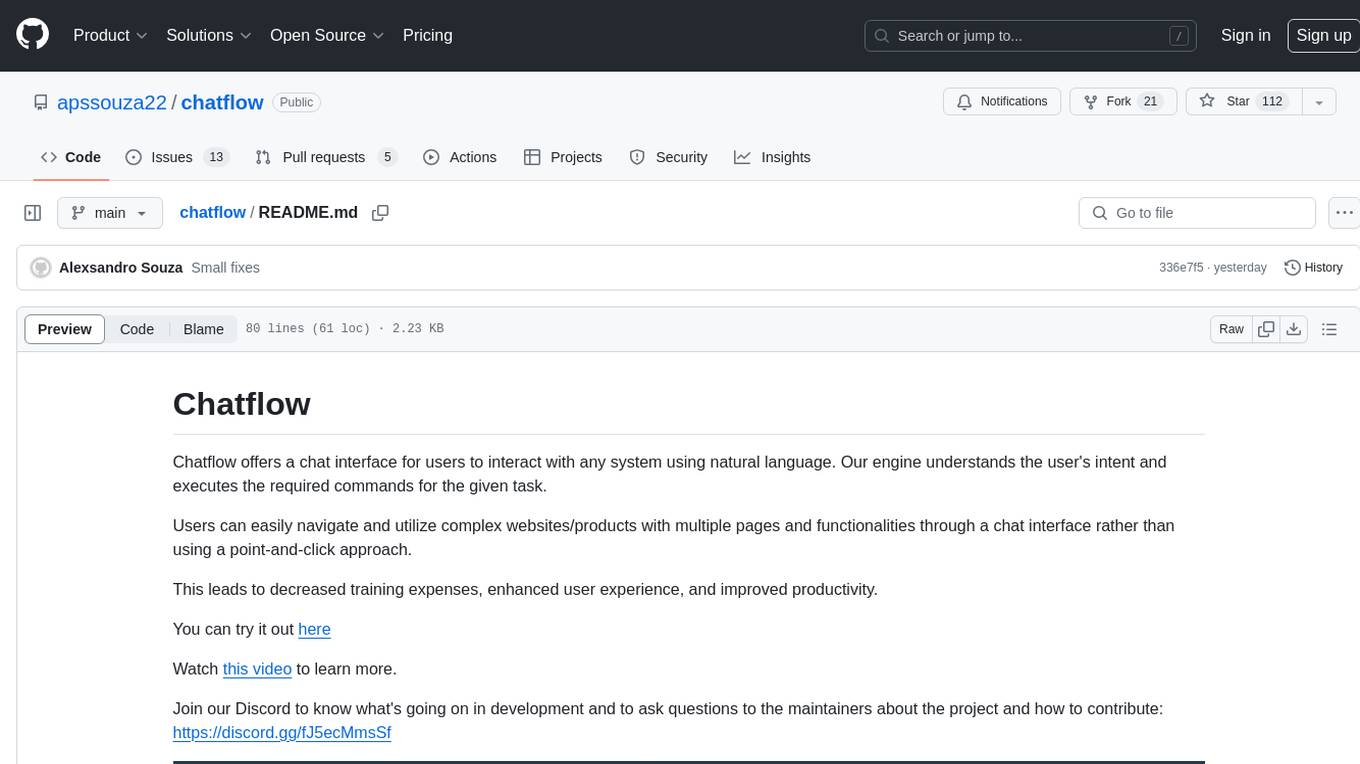
chatflow
Chatflow is a tool that provides a chat interface for users to interact with systems using natural language. The engine understands user intent and executes commands for tasks, allowing easy navigation of complex websites/products. This approach enhances user experience, reduces training costs, and boosts productivity.
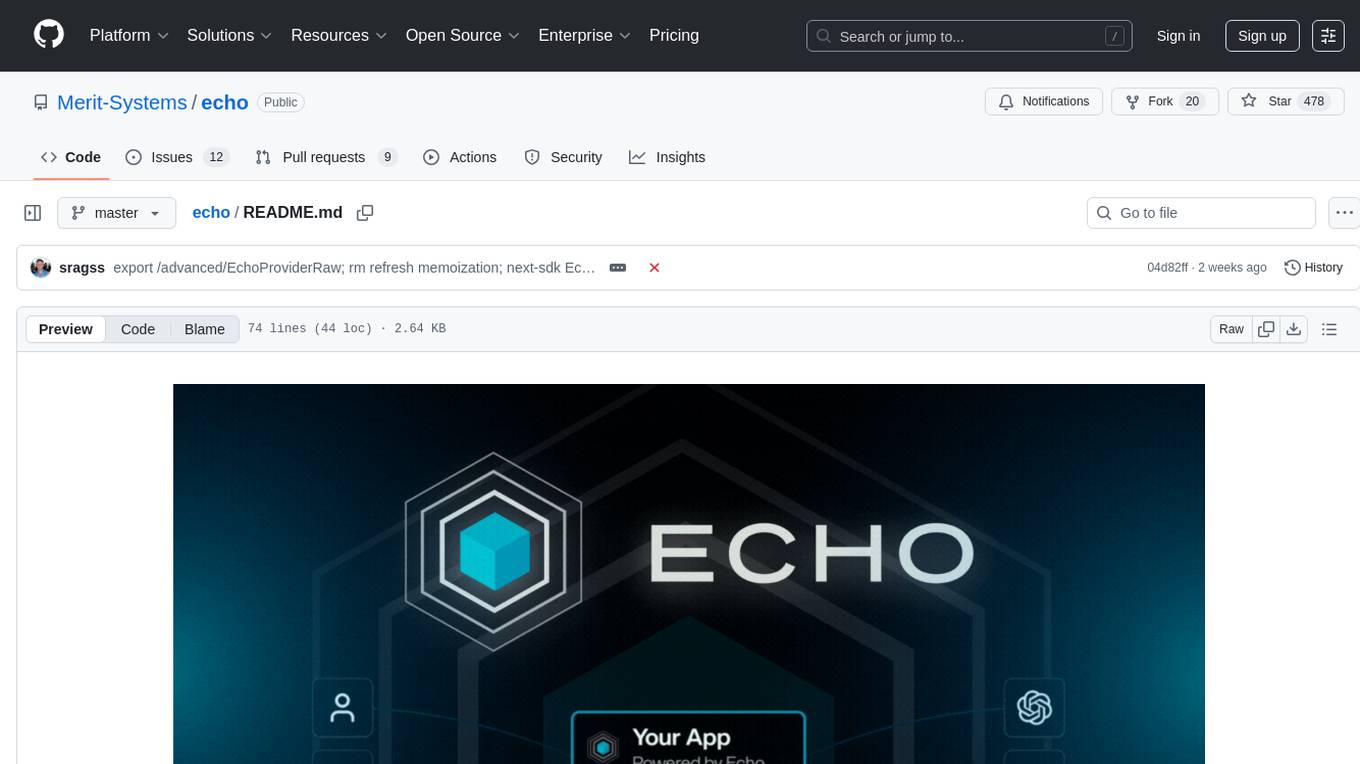
echo
Echo is a tool that simplifies the integration of AI SDKs into applications, providing instant OAuth, user accounts, and usage billing in just 5 lines of code. It eliminates the need to manage API keys, build authentication flows, or set up payment processing, allowing developers to go live in minutes. Users benefit from a universal balance that works across all Echo-powered apps, with revenue directly hitting the developer's GitHub account. Echo offers various SDKs for different frameworks like Next.js and React, along with templates to quickly start projects with Echo integration.

collections
Collections is a multilingual headless CMS with AI-powered editing and SEO optimization. It supports automatic translation into +30 languages, making websites more accessible and reaching a broader audience. The platform offers features like multilingual content, Notion-like editor, and post versioning. It is built on a tech stack consisting of PostgreSQL for the database, Node.js and Express for the backend, and React with MUI for the frontend. Collections aims to simplify the process of creating and managing multilingual websites with the help of AI technology.
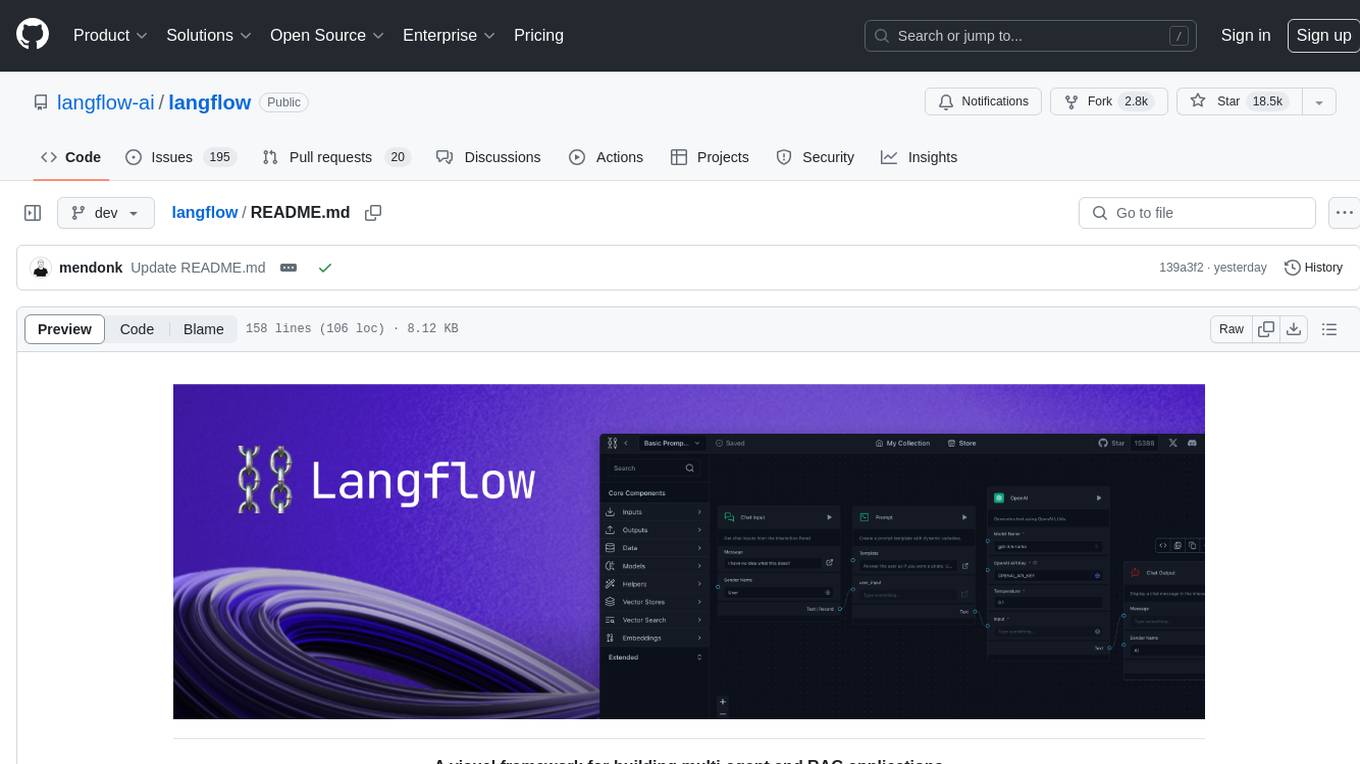
langflow
Langflow is an open-source Python-powered visual framework designed for building multi-agent and RAG applications. It is fully customizable, language model agnostic, and vector store agnostic. Users can easily create flows by dragging components onto the canvas, connect them, and export the flow as a JSON file. Langflow also provides a command-line interface (CLI) for easy management and configuration, allowing users to customize the behavior of Langflow for development or specialized deployment scenarios. The tool can be deployed on various platforms such as Google Cloud Platform, Railway, and Render. Contributors are welcome to enhance the project on GitHub by following the contributing guidelines.
For similar tasks
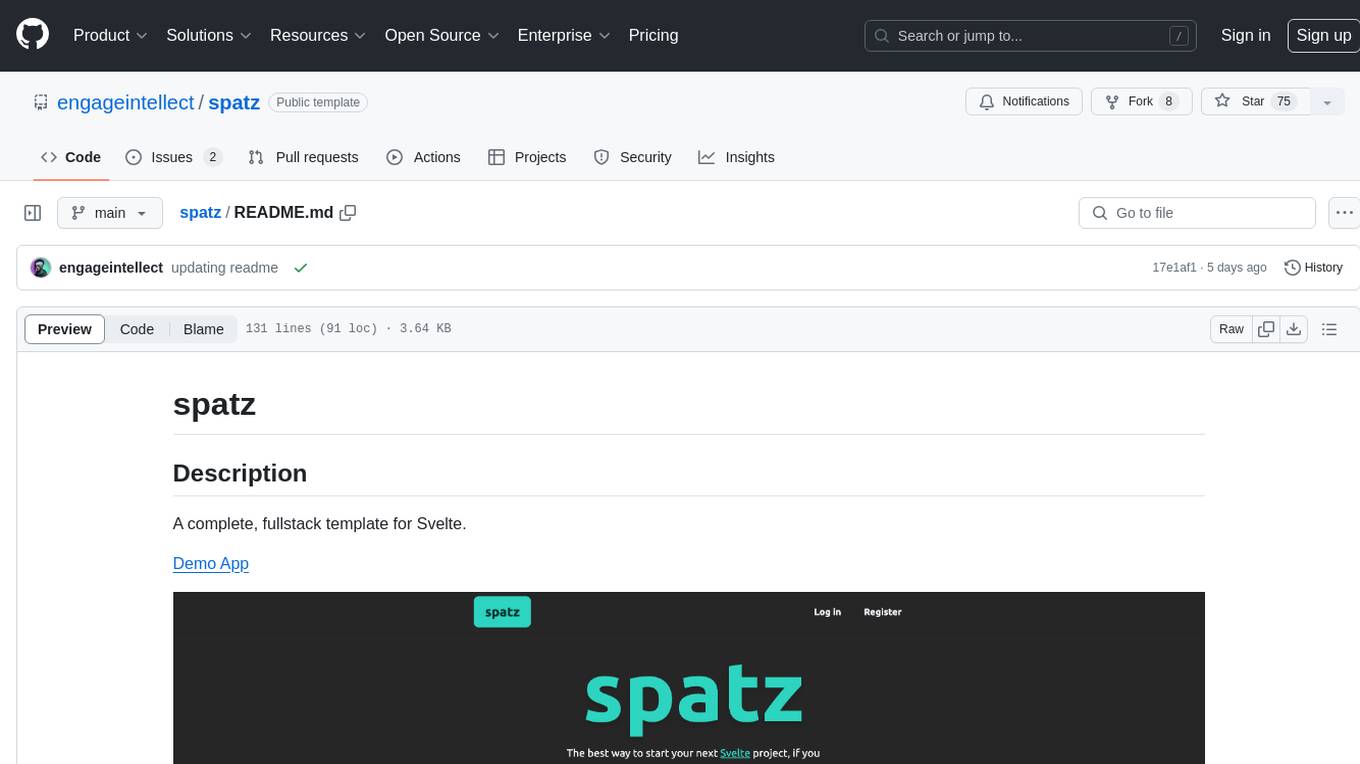
spatz
Spatz is a complete, fullstack template for Svelte that includes features such as Sveltekit for building fast web apps, Pocketbase for User Auth and Database, OpenAI for chatbots, Vercel AI SDK for AI/ML models, TailwindCSS for UI development, DaisyUI for components, and Zod for schema declaration and validation. The template provides a structured project setup with components, stores, routes, and APIs. It also offers theming and styling options with pre-loaded themes from DaisyUI. Contributions are welcomed through feature requests or pull requests.

mesop
Mesop is a Python-based UI framework designed for rapid web app development, particularly for demos and internal apps. It offers an intuitive interface for UI novices, frictionless developer workflows with hot reload and IDE support, and flexibility to build custom UIs without the need for JavaScript/CSS/HTML. Mesop allows users to write UI in idiomatic Python code and compose UI into components using Python functions. It is used at Google for internal app development and provides a quick way to build delightful web apps in Python.
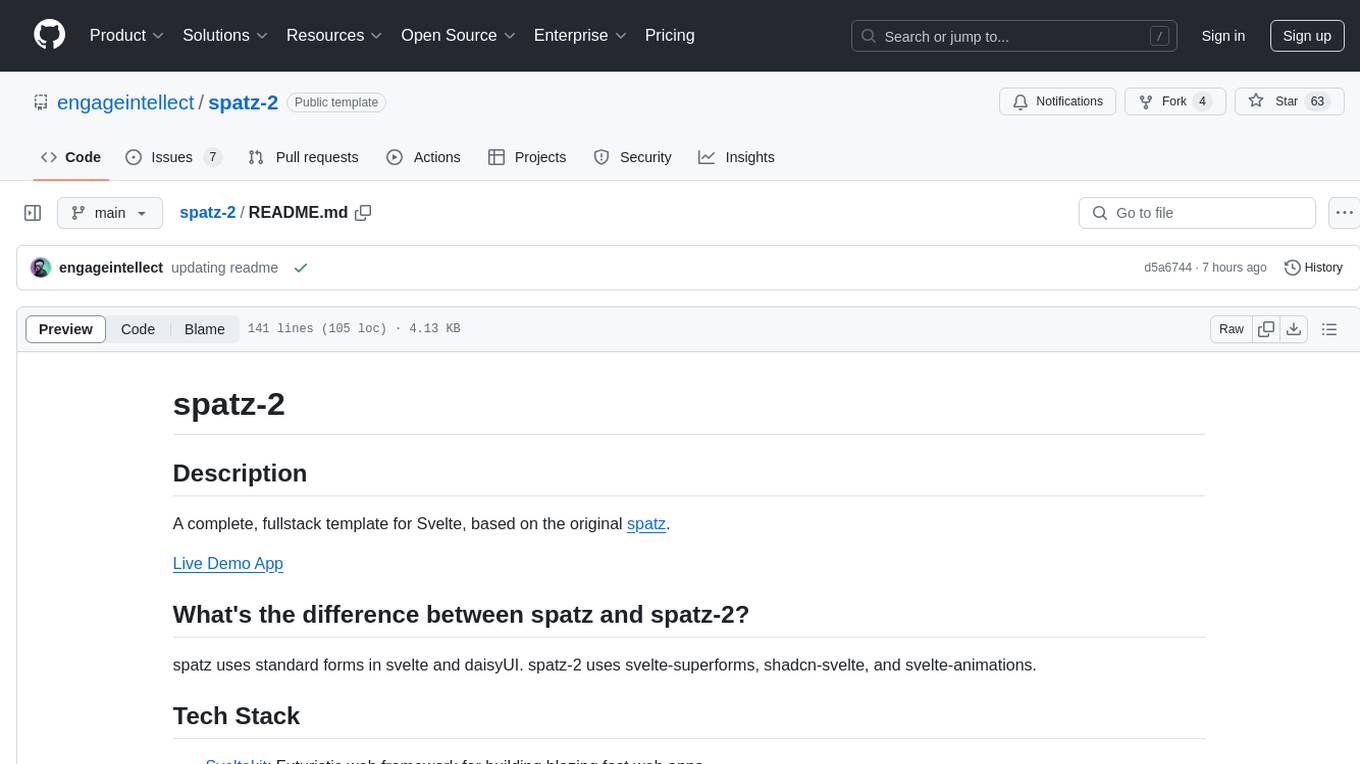
spatz-2
Spatz-2 is a complete, fullstack template for Svelte, utilizing technologies such as Sveltekit, Pocketbase, OpenAI, Vercel AI SDK, TailwindCSS, svelte-animations, and Zod. It offers features like user authentication, admin dashboard, dark/light mode themes, AI chatbot, guestbook, and forms with client/server validation. The project structure includes components, stores, routes, APIs, and icons. Spatz-2 aims to provide a futuristic web framework for building fast web apps with advanced functionalities and easy customization.
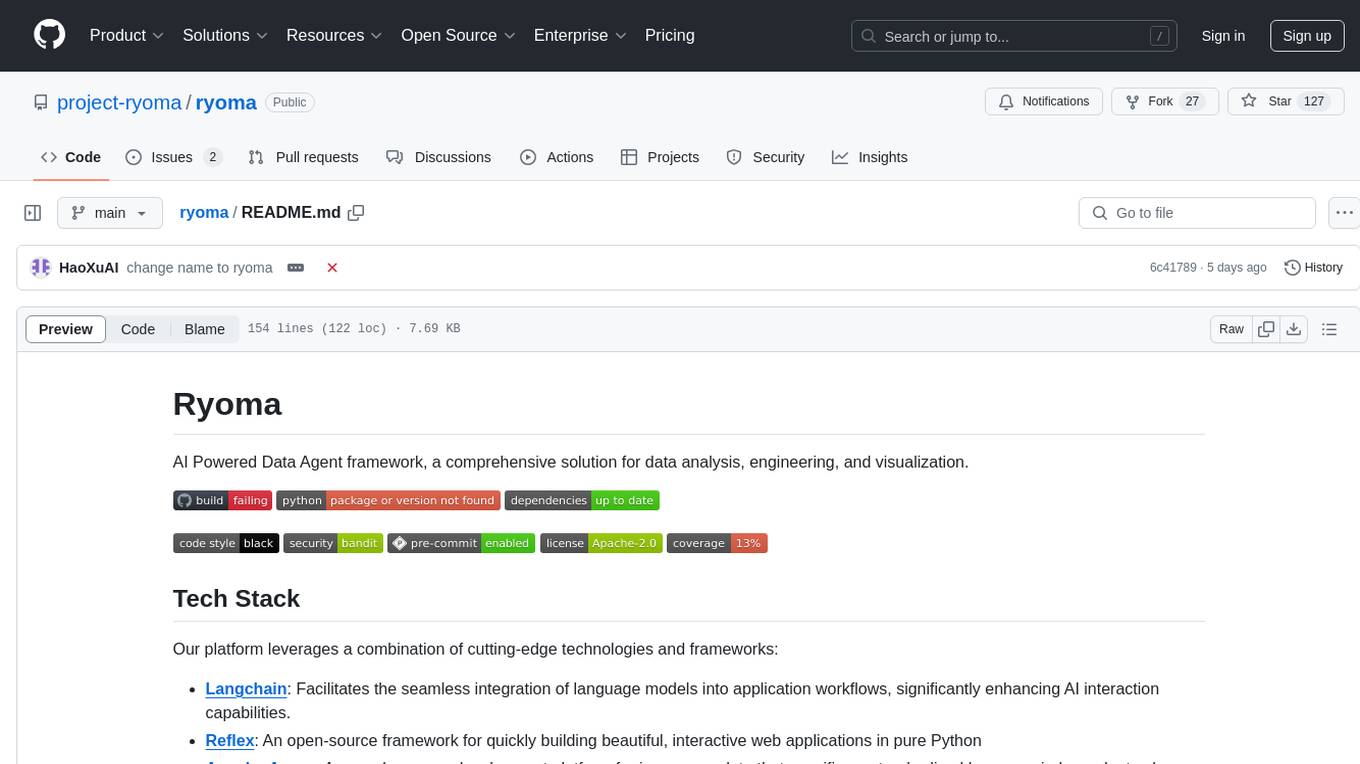
ryoma
Ryoma is an AI Powered Data Agent framework that offers a comprehensive solution for data analysis, engineering, and visualization. It leverages cutting-edge technologies like Langchain, Reflex, Apache Arrow, Jupyter Ai Magics, Amundsen, Ibis, and Feast to provide seamless integration of language models, build interactive web applications, handle in-memory data efficiently, work with AI models, and manage machine learning features in production. Ryoma also supports various data sources like Snowflake, Sqlite, BigQuery, Postgres, MySQL, and different engines like Apache Spark and Apache Flink. The tool enables users to connect to databases, run SQL queries, and interact with data and AI models through a user-friendly UI called Ryoma Lab.
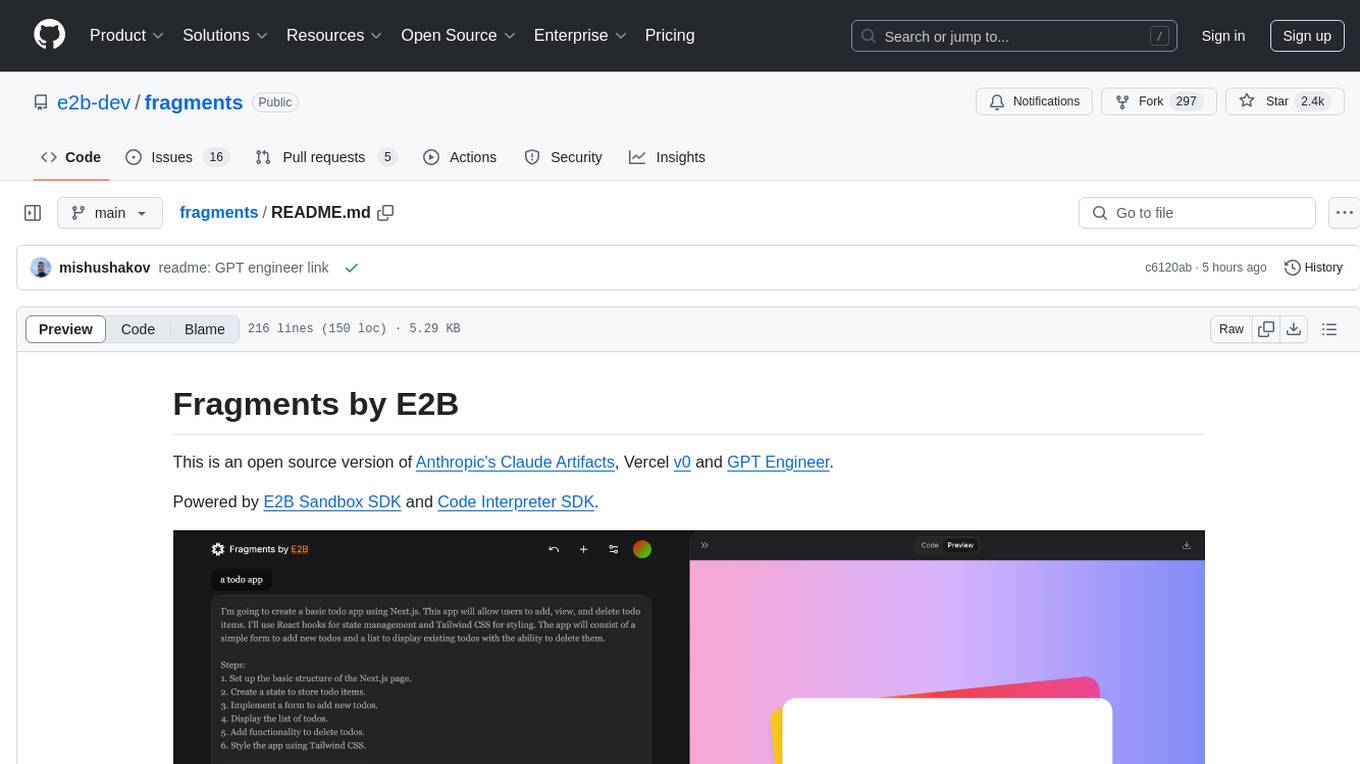
fragments
Fragments is an open-source tool that leverages Anthropic's Claude Artifacts, Vercel v0, and GPT Engineer. It is powered by E2B Sandbox SDK and Code Interpreter SDK, allowing secure execution of AI-generated code. The tool is based on Next.js 14, shadcn/ui, TailwindCSS, and Vercel AI SDK. Users can stream in the UI, install packages from npm and pip, and add custom stacks and LLM providers. Fragments enables users to build web apps with Python interpreter, Next.js, Vue.js, Streamlit, and Gradio, utilizing providers like OpenAI, Anthropic, Google AI, and more.
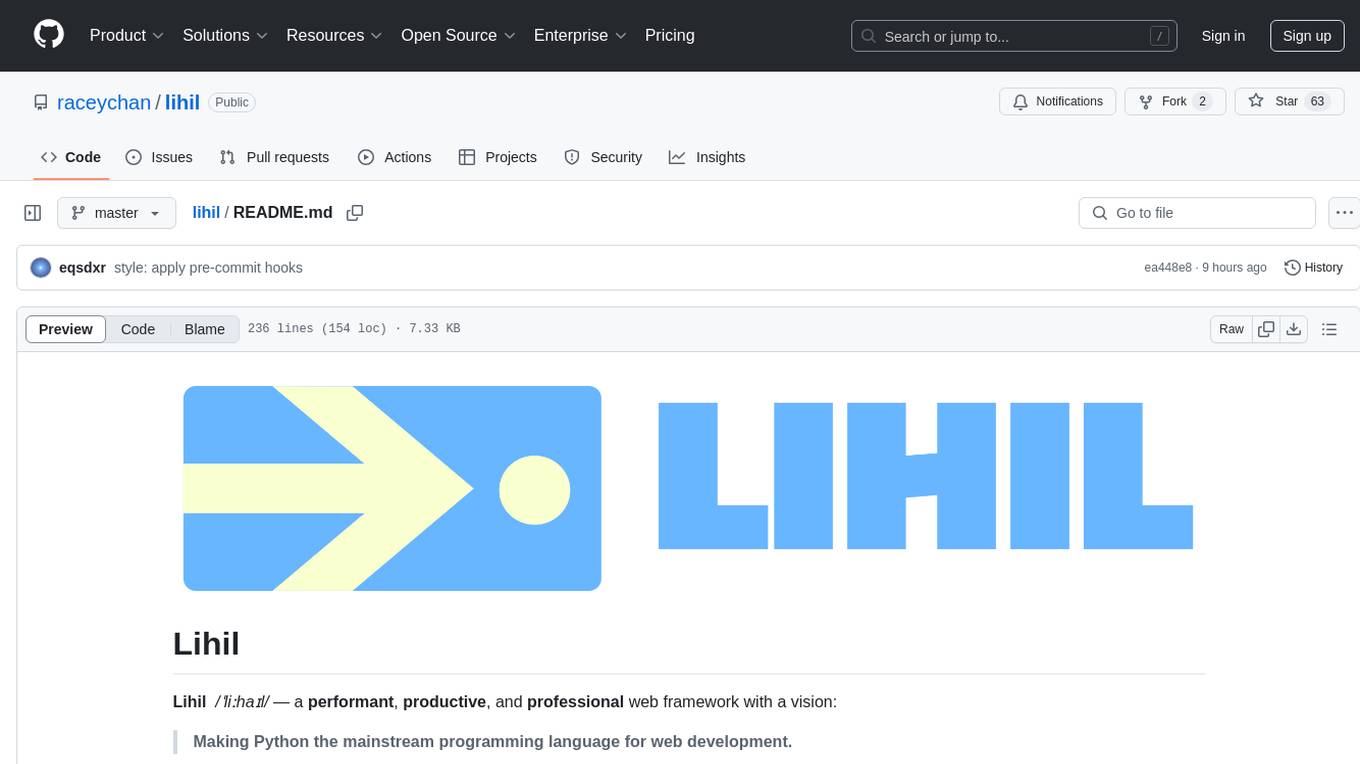
lihil
Lihil is a performant, productive, and professional web framework designed to make Python the mainstream programming language for web development. It is 100% test covered and strictly typed, offering fast performance, ergonomic API, and built-in solutions for common problems. Lihil is suitable for enterprise web development, delivering robust and scalable solutions with best practices in microservice architecture and related patterns. It features dependency injection, OpenAPI docs generation, error response generation, data validation, message system, testability, and strong support for AI features. Lihil is ASGI compatible and uses starlette as its ASGI toolkit, ensuring compatibility with starlette classes and middlewares. The framework follows semantic versioning and has a roadmap for future enhancements and features.
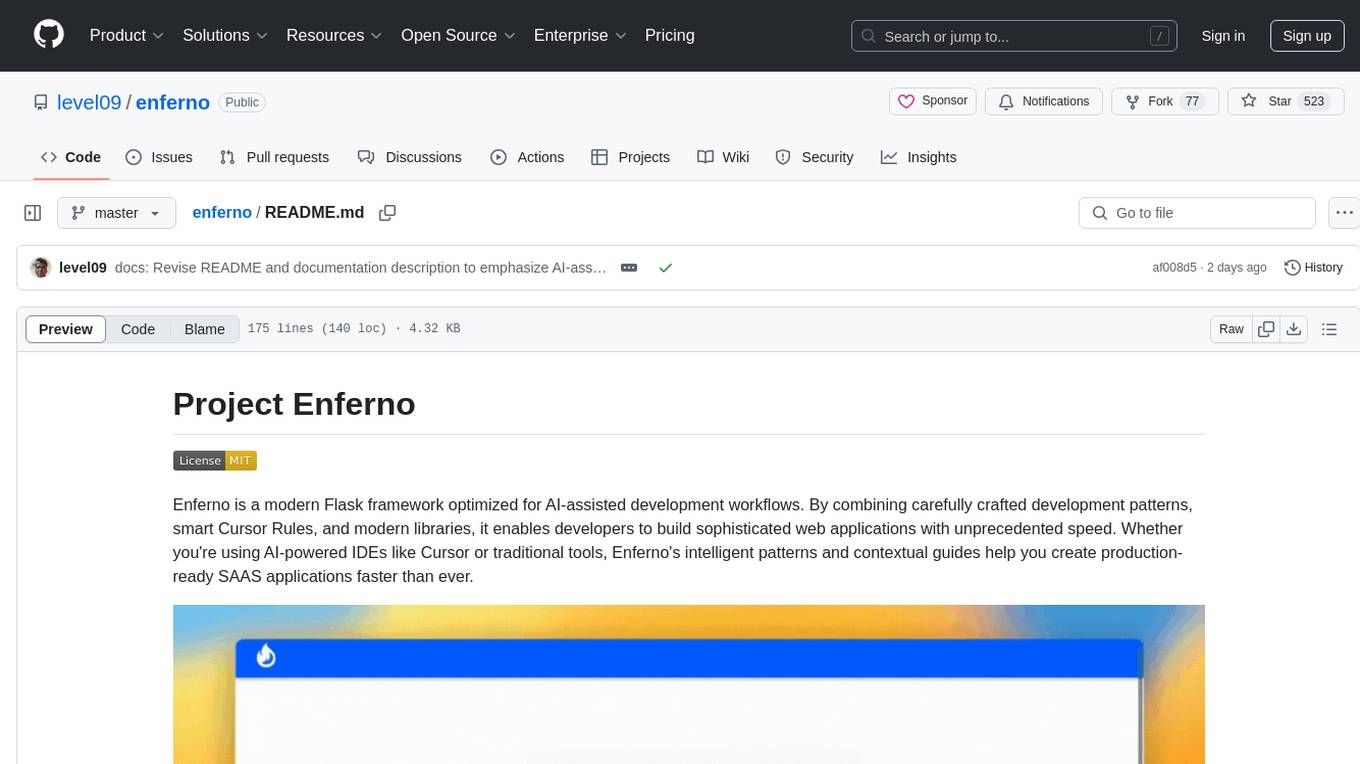
enferno
Enferno is a modern Flask framework optimized for AI-assisted development workflows. It combines carefully crafted development patterns, smart Cursor Rules, and modern libraries to enable developers to build sophisticated web applications with unprecedented speed. Enferno's intelligent patterns and contextual guides help create production-ready SAAS applications faster than ever. It includes features like modern stack, authentication, OAuth integration, database support, task queue, frontend components, security measures, Docker readiness, and more.

mesop
Mesop is a Python-based UI framework designed for rapid web app development, particularly for demos and internal apps. It allows users to write UI in Python code, offers reactive UI paradigm, ready-to-use components, hot reload feature, rich IDE support, and the ability to build custom UIs without writing Javascript/CSS/HTML. Mesop is intuitive for UI novices, provides frictionless developer workflows, and is flexible for creating delightful demos. It is used at Google for rapid internal app development.
For similar jobs

resonance
Resonance is a framework designed to facilitate interoperability and messaging between services in your infrastructure and beyond. It provides AI capabilities and takes full advantage of asynchronous PHP, built on top of Swoole. With Resonance, you can: * Chat with Open-Source LLMs: Create prompt controllers to directly answer user's prompts. LLM takes care of determining user's intention, so you can focus on taking appropriate action. * Asynchronous Where it Matters: Respond asynchronously to incoming RPC or WebSocket messages (or both combined) with little overhead. You can set up all the asynchronous features using attributes. No elaborate configuration is needed. * Simple Things Remain Simple: Writing HTTP controllers is similar to how it's done in the synchronous code. Controllers have new exciting features that take advantage of the asynchronous environment. * Consistency is Key: You can keep the same approach to writing software no matter the size of your project. There are no growing central configuration files or service dependencies registries. Every relation between code modules is local to those modules. * Promises in PHP: Resonance provides a partial implementation of Promise/A+ spec to handle various asynchronous tasks. * GraphQL Out of the Box: You can build elaborate GraphQL schemas by using just the PHP attributes. Resonance takes care of reusing SQL queries and optimizing the resources' usage. All fields can be resolved asynchronously.

aiogram_bot_template
Aiogram bot template is a boilerplate for creating Telegram bots using Aiogram framework. It provides a solid foundation for building robust and scalable bots with a focus on code organization, database integration, and localization.

pinecone-ts-client
The official Node.js client for Pinecone, written in TypeScript. This client library provides a high-level interface for interacting with the Pinecone vector database service. With this client, you can create and manage indexes, upsert and query vector data, and perform other operations related to vector search and retrieval. The client is designed to be easy to use and provides a consistent and idiomatic experience for Node.js developers. It supports all the features and functionality of the Pinecone API, making it a comprehensive solution for building vector-powered applications in Node.js.
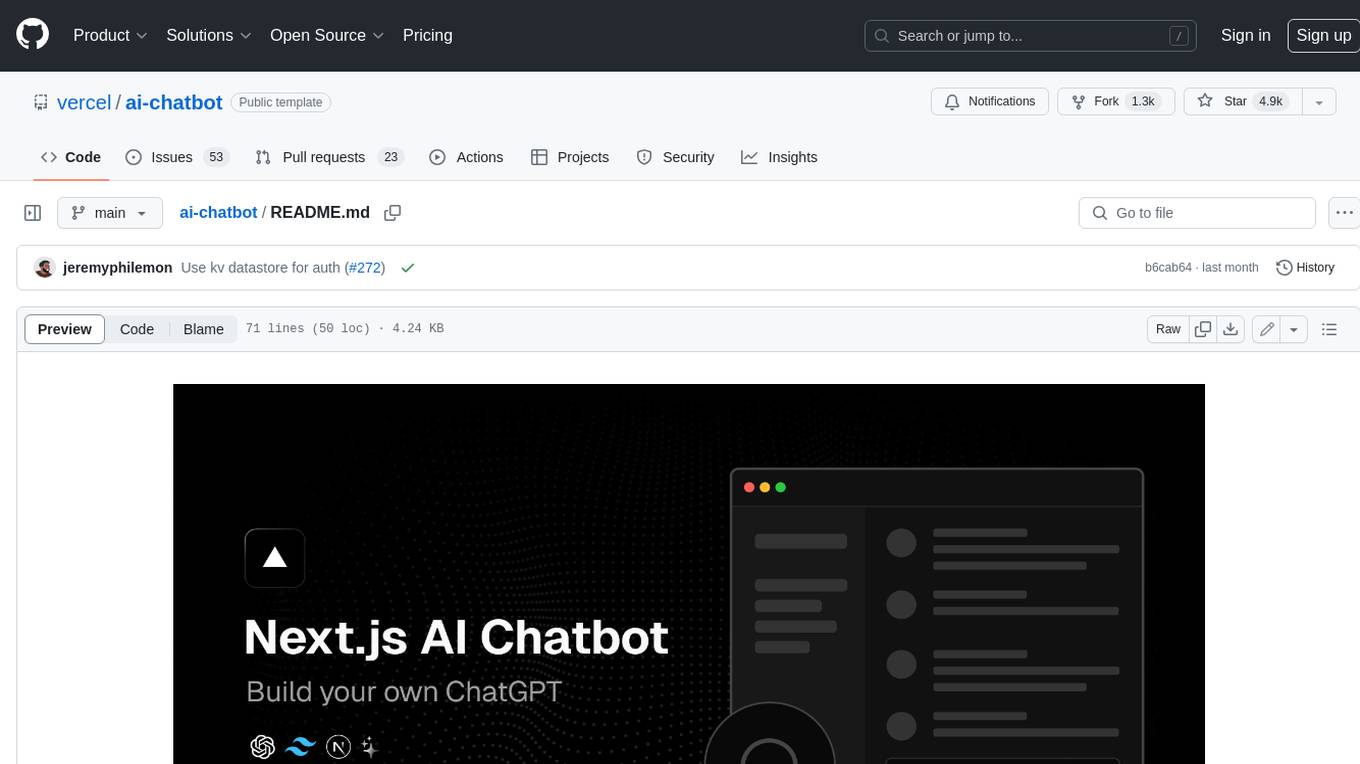
ai-chatbot
Next.js AI Chatbot is an open-source app template for building AI chatbots using Next.js, Vercel AI SDK, OpenAI, and Vercel KV. It includes features like Next.js App Router, React Server Components, Vercel AI SDK for streaming chat UI, support for various AI models, Tailwind CSS styling, Radix UI for headless components, chat history management, rate limiting, session storage with Vercel KV, and authentication with NextAuth.js. The template allows easy deployment to Vercel and customization of AI model providers.
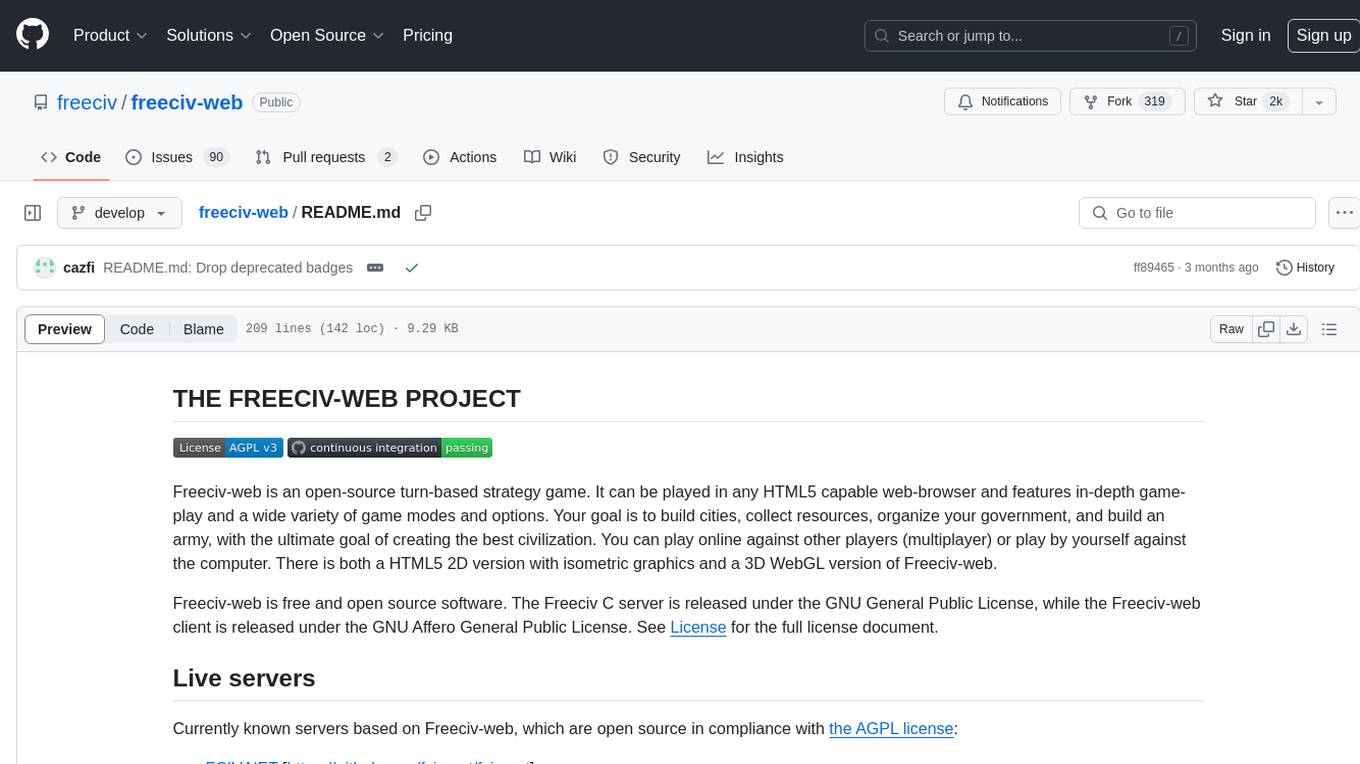
freeciv-web
Freeciv-web is an open-source turn-based strategy game that can be played in any HTML5 capable web-browser. It features in-depth gameplay, a wide variety of game modes and options. Players aim to build cities, collect resources, organize their government, and build an army to create the best civilization. The game offers both multiplayer and single-player modes, with a 2D version with isometric graphics and a 3D WebGL version available. The project consists of components like Freeciv-web, Freeciv C server, Freeciv-proxy, Publite2, and pbem for play-by-email support. Developers interested in contributing can check the GitHub issues and TODO file for tasks to work on.
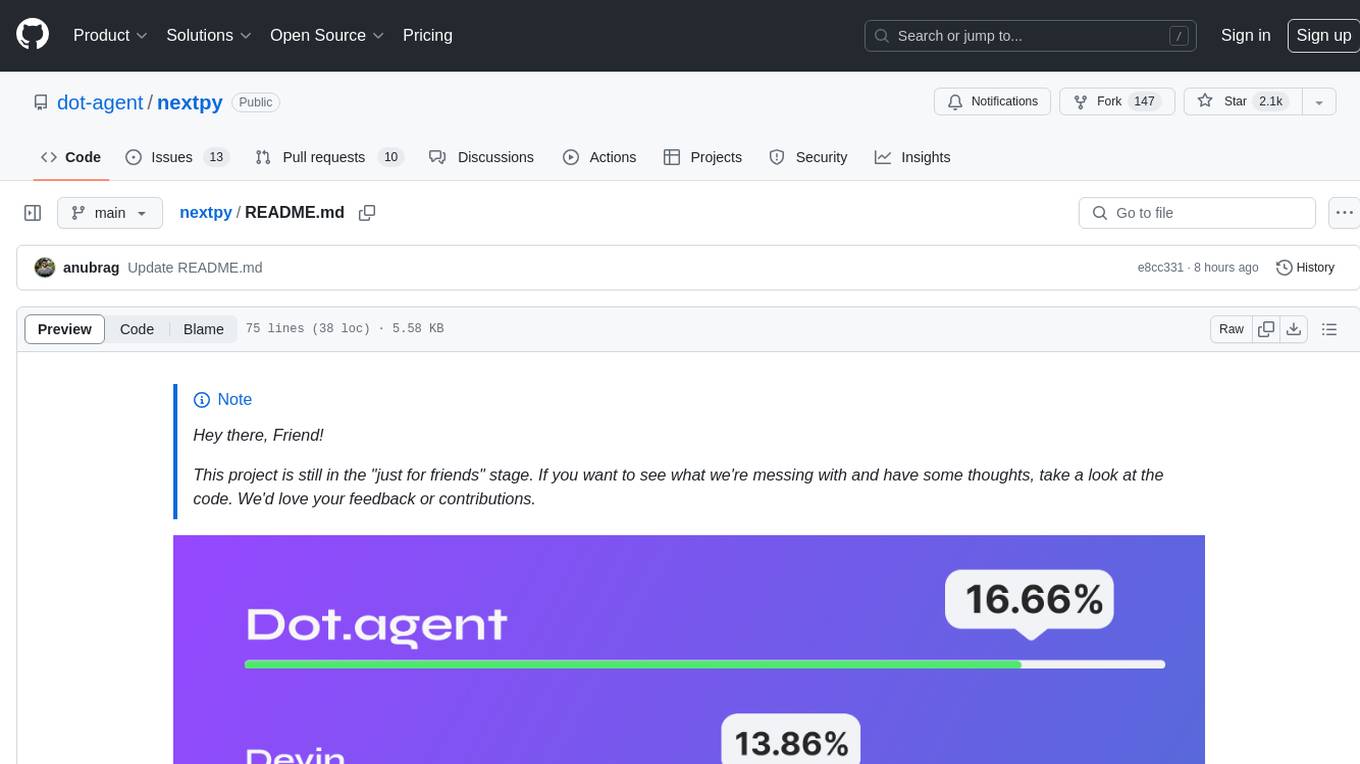
nextpy
Nextpy is a cutting-edge software development framework optimized for AI-based code generation. It provides guardrails for defining AI system boundaries, structured outputs for prompt engineering, a powerful prompt engine for efficient processing, better AI generations with precise output control, modularity for multiplatform and extensible usage, developer-first approach for transferable knowledge, and containerized & scalable deployment options. It offers 4-10x faster performance compared to Streamlit apps, with a focus on cooperation within the open-source community and integration of key components from various projects.
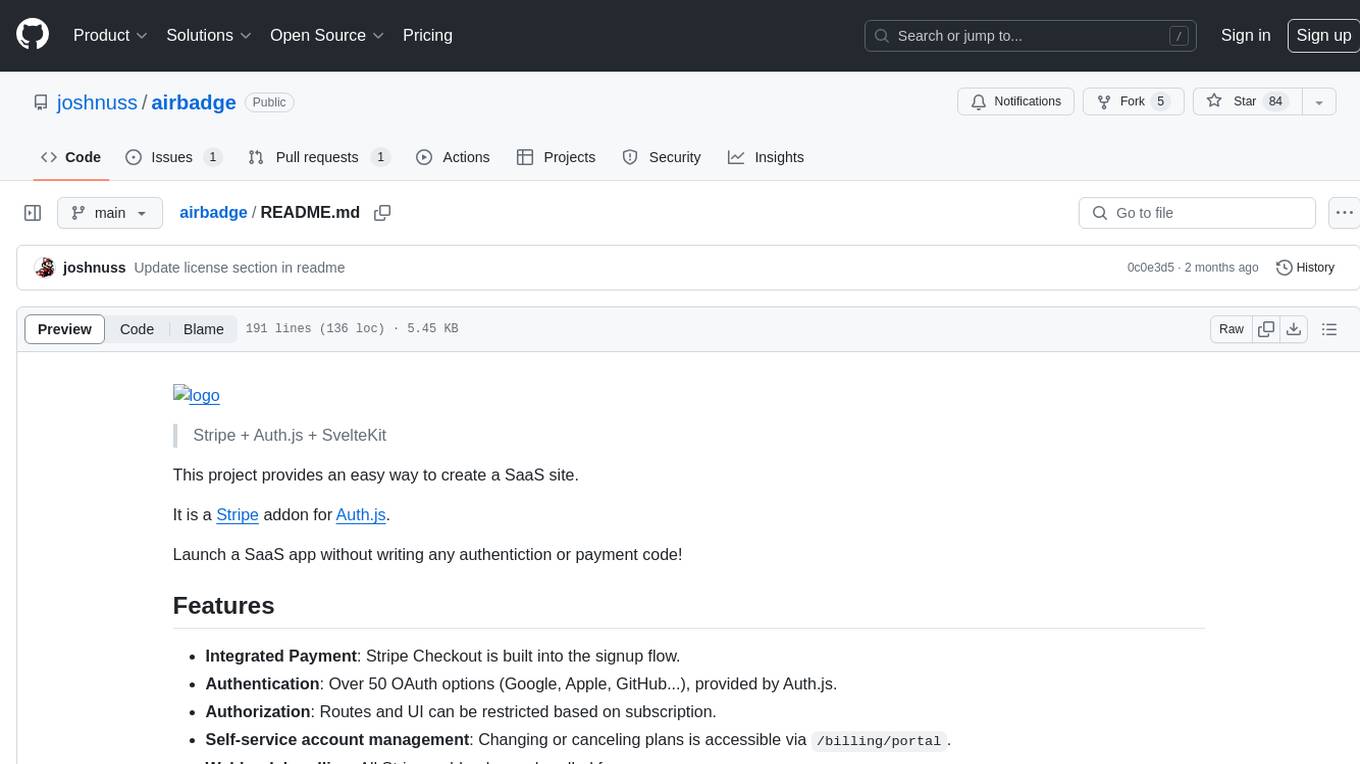
airbadge
Airbadge is a Stripe addon for Auth.js that provides an easy way to create a SaaS site without writing any authentication or payment code. It integrates Stripe Checkout into the signup flow, offers over 50 OAuth options for authentication, allows route and UI restriction based on subscription, enables self-service account management, handles all Stripe webhooks, supports trials and free plans, includes subscription and plan data in the session, and is open source with a BSL license. The project also provides components for conditional UI display based on subscription status and helper functions to restrict route access. Additionally, it offers a billing endpoint with various routes for billing operations. Setup involves installing @airbadge/sveltekit, setting up a database provider for Auth.js, adding environment variables, configuring authentication and billing options, and forwarding Stripe events to localhost.
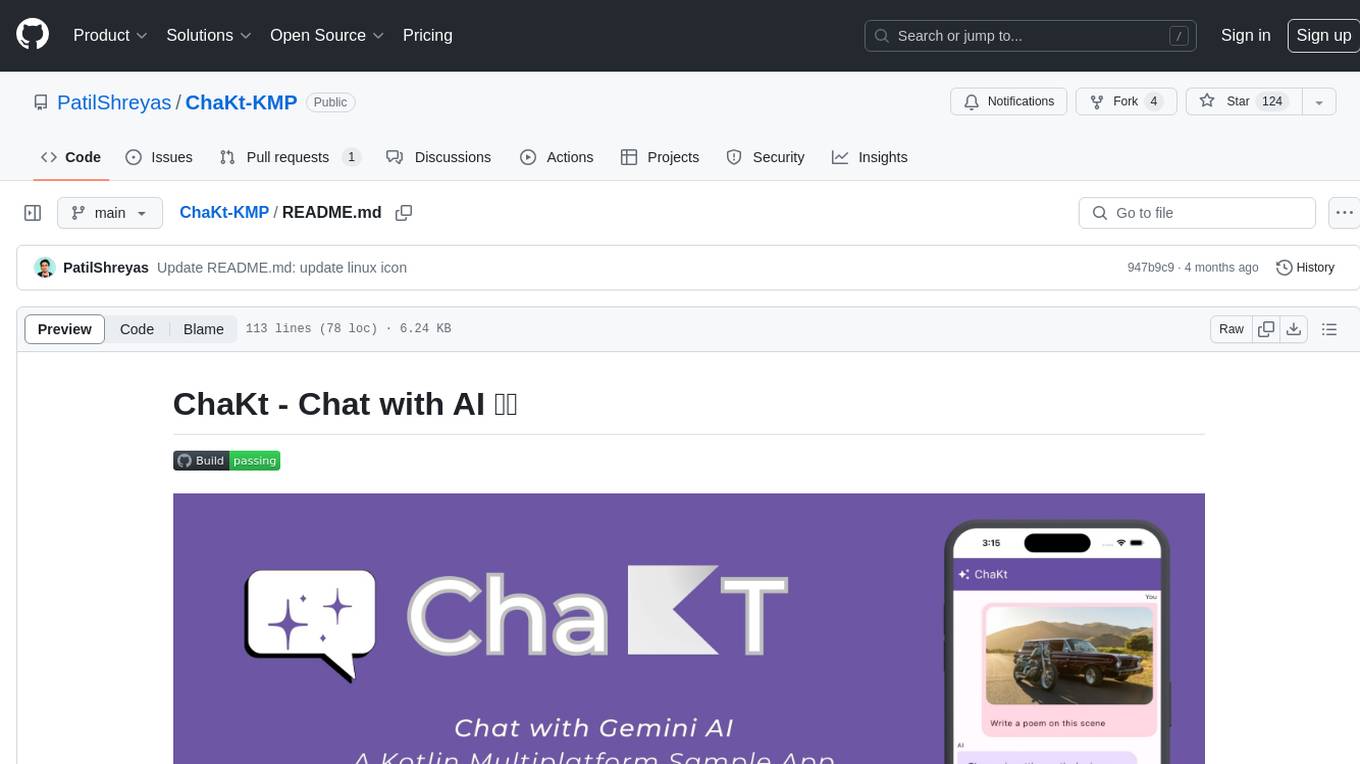
ChaKt-KMP
ChaKt is a multiplatform app built using Kotlin and Compose Multiplatform to demonstrate the use of Generative AI SDK for Kotlin Multiplatform to generate content using Google's Generative AI models. It features a simple chat based user interface and experience to interact with AI. The app supports mobile, desktop, and web platforms, and is built with Kotlin Multiplatform, Kotlin Coroutines, Compose Multiplatform, Generative AI SDK, Calf - File picker, and BuildKonfig. Users can contribute to the project by following the guidelines in CONTRIBUTING.md. The app is licensed under the MIT License.


